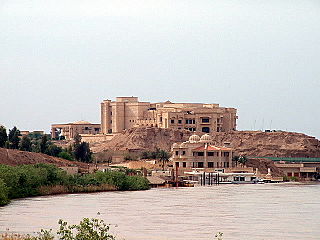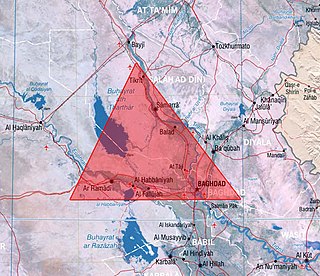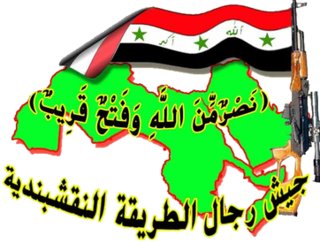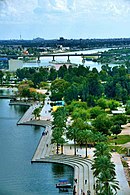Related Research Articles

Tikrit is a city in Iraq, located 140 kilometers (87 mi) northwest of Baghdad and 220 kilometers (140 mi) southeast of Mosul on the Tigris River. It is the administrative center of the Saladin Governorate. As of 2012, it had a population of approximately 160,000.

The Sunni Triangle is a densely populated region of Iraq to the north and west of Baghdad inhabited mostly by Sunni Muslim Arabs. The roughly triangular area's points are usually said to lie near Baghdad, Ramadi and Tikrit. Each side is approximately 125 kilometers long. The area also contains the cities of Samarra, Fallujah, Balad, Hīt, Al-Taji and Al-Karmah.

An Iraqi insurgency began shortly after the 2003 American invasion deposed longtime leader Saddam Hussein. It is considered to have lasted until the end of the Iraq War and U.S. withdrawal in 2011. It was followed by a renewed insurgency.

After the 2003 invasion of Iraq was completed and the regime of Saddam Hussein was toppled in May 2003, an Iraqi insurgency began that would last until the United States left in 2011. The 2003–2006 phase of the Iraqi insurgency lasted until early 2006, when it escalated from an insurgency to a Sunni-Shia civil war, which became the most violent phase of the Iraq War.
Events in the year 2005 in Iraq.
Minorities in Iraq include various ethnic and religious groups.

Mahmoudiyah is a rural city south of Baghdad. Known as the "Gateway to Baghdad," the city's proximity to Baghdad made it central to the counterinsurgency campaign.
Sectarian violence in Iraq developed as a result of rising sectarian tensions between the different religious and ethnic groups of Iraq, most notably the conflict between the Shi'i Muslim majority and the Sunni Muslim minority within the country.

The 1991 Iraqi uprisings were ethnic and religious uprisings against Saddam Hussein's regime in Iraq that were led by Shia Arabs and Kurds. The uprisings lasted from March to April 1991 after a ceasefire following the end of the Gulf War. The mostly uncoordinated insurgency was fueled by the perception that Iraqi President Saddam Hussein had become vulnerable to regime change. This perception of weakness was largely the result of the outcome of the Iran–Iraq War and the Gulf War, both of which occurred within a single decade and devastated the population and economy of Iraq.

Operation Imposing Law, also known as Operation Law and Order, Operation Fardh al-Qanoon or Baghdad Security Plan (BSP), was a joint Coalition-Iraqi security plan conducted throughout Baghdad. Under the Surge plan developed in late 2006, Baghdad was to be divided into nine zones, with Iraqi and American soldiers working side by side to clear each sector of Shiite militias and Sunni insurgents and establish Joint Security Stations so that reconstruction programs could begin in safety. The U.S. military commander in Iraq, David Petraeus, went so far as to say Iraq would be "doomed" if this plan failed. Numerous members of Congress stated the plan was a critical period for the U.S. presence in Iraq.

Al-Mansour or just Mansour is one of the nine administrative districts in Baghdad, Iraq. It is in western Baghdad and is bounded on the east by al-Karkh district in central Baghdad, to the north by Kadhimiya, to the west by Baghdad International Airport, and to the south by Baghdad Airport Road, on the other side of which is al-Rashid district.

Dora is a neighborhood in Al Rashid administrative district, southern Baghdad, Iraq. Before the 2003 U.S. invasion of Iraq, it was home to the city's largest concentration of Christian Assyrians, as well as Mandaeans and Muslim families.

Operation Phantom Thunder began on 16 June 2007, when Multi-National Force-Iraq launched major offensive operations against al-Qaeda and other extremist terrorists operating throughout Iraq. It was the largest coordinated military operation since the 2003 invasion of Iraq. Operation Phantom Thunder was a corps level operation, including Operation Arrowhead Ripper in Diyala Province, Operation Marne Torch and Operation Commando Eagle in Babil Province, Operation Fardh al-Qanoon in Baghdad, Operation Alljah in Anbar Province, and continuing special forces actions against the Mahdi Army in southern Iraq and against Al-Qaeda leadership throughout the country. The operation was one of the biggest military operations in Iraq since the U.S. invasion in 2003.

Operation Marne Torch refers to two operations launched by U.S.-led Coalition forces in 2007 against al-Qaeda in Iraq in the Arab Jabour area of Babil province. This campaign is named after Operation Torch, the joint US/British invasion of French North Africa in 1942, presumably because of the two operations' similar thrust into the enemies' southern underbellies.

Operation Phantom Strike was a major offensive launched by the Multi-National Corps – Iraq on 15 August 2007 in a crackdown to disrupt both the al-Qaeda-affiliated Islamic State of Iraq and Shia insurgent operations in Iraq. It consisted of a number of simultaneous operations throughout Iraq focused on pursuing remaining ISI terrorists and Iranian-supported insurgent groups. It was concluded in January 2008 and followed up with Operation Phantom Phoenix.
Operation Phantom Phoenix was a major nationwide offensive launched by the Multinational Force Iraq (MNF-I) on 8 January 2008 in an attempt to build on the success of the two previous corps-level operations, Operation Phantom Thunder and Operation Phantom Strike and further reduce violence and secure Iraq's population, particularly in the capital Baghdad. The offensive consisted of a number of joint Coalition and Iraqi Army operations throughout northern Iraq as well as in the southern Baghdad Belts.
Dulaim or Dulaimi or Al Duliam or Dulaym is an Arab royal tribe, with over seven million members. The tribe's history goes back to pre-Islamic times and members reside today in Iraq and neighboring countries such as Syria, Kuwait and Jordan.

The Army of the Men of the Naqshbandi Order (Arabic: جيش رجال الطريقة النقشبندية Jaysh Rijāl aṭ-Ṭarīqa an-Naqshabandiya), (JRTN) also called the Naqshbandi Army, is one of a number of underground Ba'athist militant insurgency groups fighting U.S.-led Coalition forces in Iraq. Media frequently refers to the group by the initials JRTN, a romanization of its Arabic name. Supreme Command for Jihad and Liberation, technically the name of the umbrella organisation to which JRTN belongs, is also often used to refer to JRTN specifically.

Dhuluʿiya is a town in Salah ad-Din Governorate, Iraq situated on the left bank of the Tigris, near the mouth of the ʿAdhaim, some 20 miles (32 km) east of Samarra and 47 miles (76 km) north of Baghdad. The population is predominantly Sunni Arab of the Jubur tribe.
